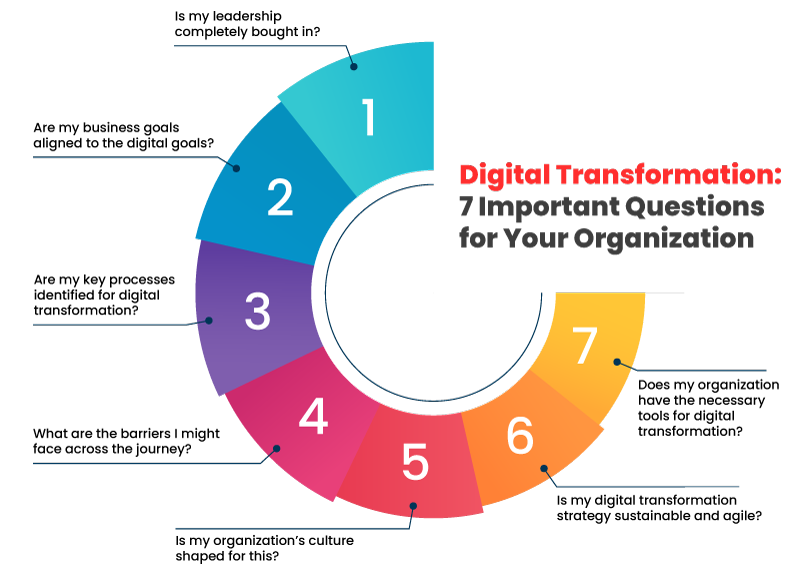
This article (Digital Transformation: 7 Important Questions for Your Organization) was first published on Customer Think
Digital transformation has become more important than ever, as it’s the only way to navigate the waters of the post-pandemic world. While digital transformation used to be something that organizations had planned to adopt in the long term, the pandemic greatly accelerated the pace of adoption of digital-first practices. And why not? The only companies that could continue their operations normally in these unprecedented times were the ones who paid attention to their digital infrastructure and had the tools ready.
A new survey by Gartner found that more CEOs than ever are considering digital change and investment to be the top priority for their respective organizations. In such a scenario, any business that is not quick to adapt to digital transformation will lose out to their competition and become obsolete. Beyond business pressure, digital transformation also brings about a ton of benefits for the organization, in both qualitative and quantitative terms.
Also read: Top Digital Transformation Quotes to Lead Growth for Your Business
The digital transformation checklist
As more and more companies are adopting digital transformation owing to the significant perks it brings, it is important to be structured and goal-oriented about it. Digital transformation is not a destination that can be reached once and for all. Instead, it is an ongoing journey that demands a commitment to adhere to changing marketing dynamics and to adopt any digital disruptors that come across the way.
Therefore, before embarking on a digital transformation or while evaluating its effectiveness, there is a checklist that acts as a guardrail for everyone in the organization. If your business is undergoing digital transformation, we want you to answer the following 7 questions to ensure that you are on the right track:

1. Is my leadership completely bought in?
As it goes for every organization, change begins at the top. It is the duty of competent leaders to set the tone right for the adoption of digital transformation, both through their decisions and actions. The senior management should devise a long-term vision for digital transformation, which can then be broken into actionable units by the rest of the employees.
Leaders need to devise policies that open the gates for digital practices to be introduced, and they need to encourage their employees to become digitally dexterous in order to make their organizations digital-ready. Only if the leadership is completely sold on the idea of digital transformation will the exercise produce tangible results.
2. Are my business goals aligned to the digital goals?
There is no standard definition of digital transformation that works across organizations. The process means different things for different organizations, depending upon their sector, vision, and business goals. Therefore, the various aspects of digital transformation need to be customized to align with business goals. If digital transformation is done for the sake of it, it will show negligible results on the company’s bottom line and would be a monumental waste of resources. Therefore, managers need to take a long and hard look at their business goals and then define what they want out of the process of digital transformation.
3. Are my key processes identified for digital transformation?
Like is with different organizations, digital transformation is not standard across processes either. Some processes have high scope for digitization, while others might only have a limited potential for it. Organizations need to define the processes that are the most crucial for the success and profitability of the company and then digitize them as much as possible. For example, paper-based administrative forms and tasks can be completely digitized using workflow automation, whereas, for field services, digital tools can act as a support feature.
Also read: 8 Common Digital Transformation Mistakes to Avoid at All Costs
4. What are the barriers I might face across the journey?
While the process of digital transformation is a desirable one, implementing the same is not an easy task. There are bound to be some hurdles across the way, which need to be identified and dealt with before they become significant bottlenecks. These hurdles might range from managing change to a lack of resources, depending upon the capabilities of various organizations. Taking these barriers into consideration will go a long way to ensure a smooth digital transformation process.
5. Is my organization’s culture shaped for this?
At the end of the day, digital transformation is not limited to just decisions and technologies. It needs to be adopted fully by each and every employee in order to be implemented successfully. Employees need to be encouraged and empowered to undergo upskilling in order to make the most out of digital tools. Citizen development goes a long way in this regard, as it allows business users to build their own solutions instead of relying on the IT departments. This cultivates innovation and digital self-sufficiency across the organization. Platforms like Quixy have empowered many business users to make the most out of the digital transformation of their organization.
6. Is my digital transformation strategy sustainable and agile?
As we mentioned, digital transformation is not a destination, but a journey. This journey will be impacted by the various market turbulences and disruptions that happen along the way. Therefore, the digital transformation strategy should be flexible and agile enough to account for the unforeseen. Organizations should be ready to embrace these changes with open arms, instead of getting thrown off track. Only if the digital transformation strategy is agile will it be able to sustain itself in the long term and yield significant results for the organization.
7. Does my organization have the necessary tools for digital transformation?
Digital vendors and platforms are extremely important to the process. Due diligence and research must be done before choosing the correct partner for digital transformation. Checks on certifications, security badges, credibility, existing clientele, etc are required to ensure the mettle of the digital partner chosen. The tools so adopted need to be innovative enough to bring about a significant impact to the process of digital transformation.
No-code is an amazing pick in this regard, as it is projected that by 2024, 65% of all software development will be driven by low-code and no-code platforms. Not only does no-code decrease the time and costs associated with traditional development, but it also fosters a new wave of innovation across companies that is very important to the process of digital transformation.

Takeaway
Even though the process of digital transformation might seem daunting and complex at first, it is definitely worth the effort. If you manage to answer these 7 questions efficiently, you will be able to have your bases covered as you embark on the process of digital transformation adoption.
When it comes to choosing a digital partner, Quixy is the perfect pick. With our pioneering no-code platform, we have empowered businesses across industries to adopt digital transformation and witness impressive results for their organization. Don’t miss out on the chance to elevate your processes. Take the first step and get started with Quixy today.
The bridge between your organization’s present and a digital future is just a click away.
Subscribe
Login
Please login to comment
0 Comments
Oldest
















